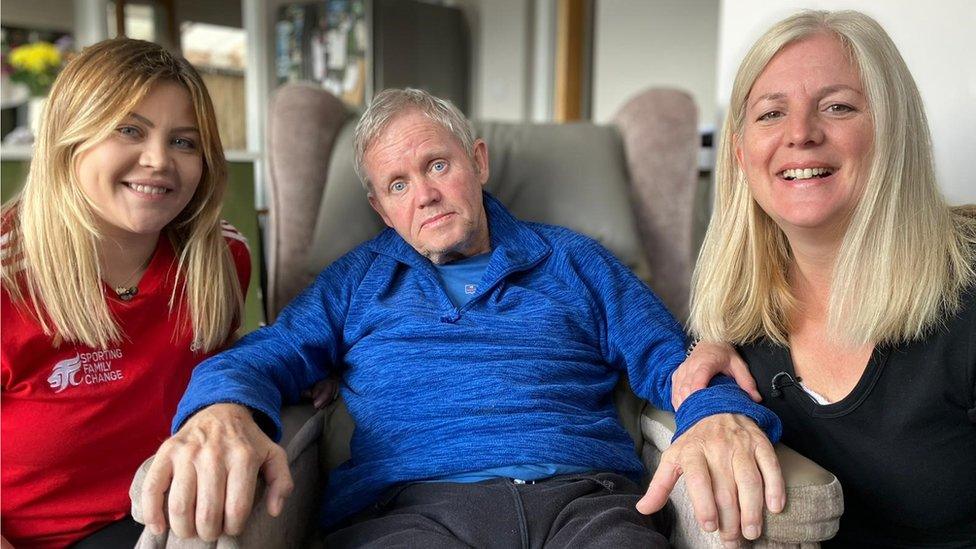Bath woman takes on walk in mission to find MND cure
- Published

Kim Hawkins with his wife Sarah and daughter Millie
A woman with a family history of motor neurone disease (MND) is set to walk 13 miles to raise awareness of the condition.
Millie Hawkins, from Midsomer Norton, will walk from Radstock to Bath Abbey on Sunday.
She was spurred into action after her father Kim, 59, was diagnosed with the incurable condition in 2020 and is now unable to speak or walk.
Millie, 25, has since learned she too could develop MND.
Kim's father Graham died from the genetic disease, aged just 41.
Kim's wife Sarah, 51, said he was told for 57 years that there was no chance of getting it "twice in one family".
They have since learned that around 5% to 10% of patients with MND have the familial gene.

Kim Hawkins is now unable to talk or walk
Millie has decided to fight for a cure and raise awareness about the condition which affects around 5,000 UK adults, according to the Motor Neurone Disease Association, external.
"I could get hit by a bus tomorrow. I don't want to live my life thinking like that," said Millie - a self-taught baker whose walk is also raising money for the association.
She said she was determined to remain positive despite her father's condition deteriorating rapidly.
"It's so quick. Every week we see something different now," she added.

Kim and Sarah Hawkins
Mrs Hawkins said: "He was lovely. Strong as an ox. The hardest-working man ever and he's just not like that anymore.
"It's cruel because he knows what's coming and he's known ever since he was diagnosed."
Mrs Hawkins said the last time she heard her husband's voice was at her 50th birthday party in August 2021.
Ammar Al-Chalabi, a professor of neurology and complex disease genetics at Kings College London, said recent trials which slowed and even reversed some of the decline caused by MND had been a "massive breakthrough".
More trials were now taking place which allowed the genetic condition to be understood "more than ever", he added.
"It shows that it's possible to give treatment that would dramatically slow MND," he said.
"It looks like it has a very dramatic effect after 12 months and can very significantly slow the disease's progress."

Follow BBC West on Facebook, external, Twitter, external and Instagram, external. Send your story ideas to: bristol@bbc.co.uk , external
Related topics
- Published21 September 2022

- Published26 September 2022

- Attribution
- Published8 September 2022

- Attribution
- Published21 July 2022
